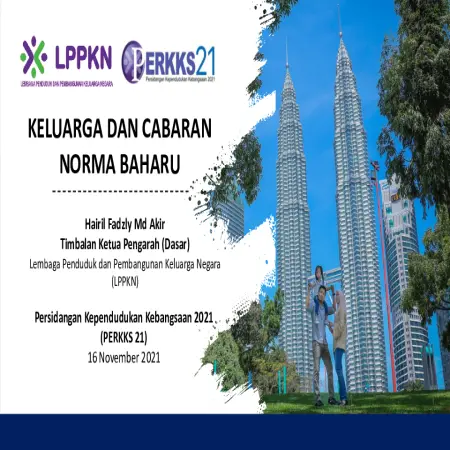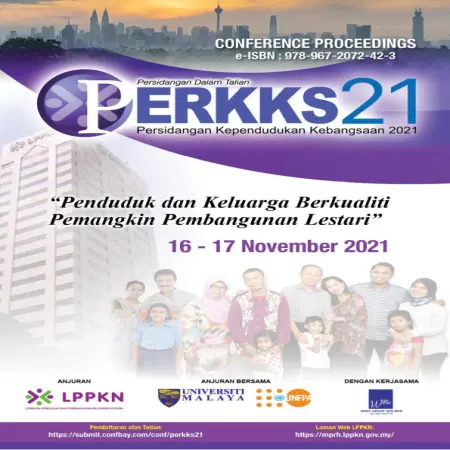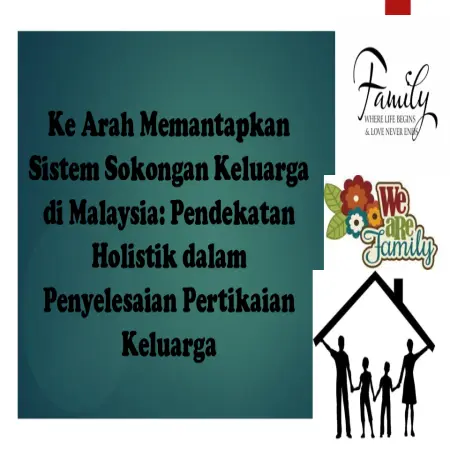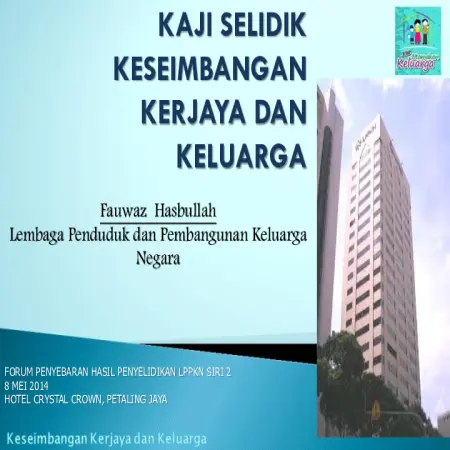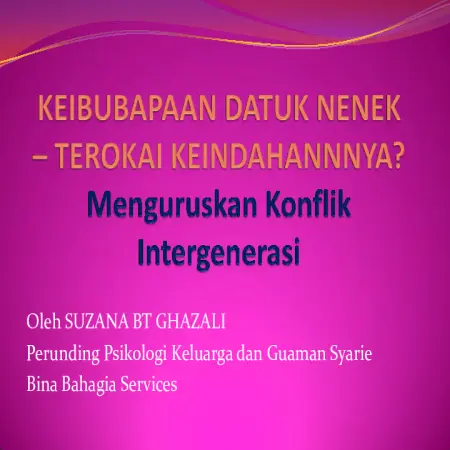TOPICS
Results for Topics : "Family"
|
|
K.A.S.I.H
Item Type: Video
Editor:
Year: 00/01/2023
Abstract: The Family KASIH campaign is an initiative of the Ministry of Women, Family and Community Development (MWFCD) through the National Population and Family Development Board (NPFDB) to deal with mental health problems among family members post-Covid-19. This campaign focuses on the application of pure family values which is LOVE which is the main core of family well-being. LOVE means Affection, Morality, Health and Safety, Knowledge and Harmony.
|
|
|
|
|
|
Konseptual kualiti hidup dalam konteks golongan pesara di Malaysia
Item Type: Article
Editor:
Year: 00/12/2021
Abstract: Quality of life carries a more complex meaning in explaining the context of an individual's life status, whether they are satisfied and happy with their living conditions or not. The phenomenon of quality of life can be measured by looking at indicators in various aspects whether monetary or non-monetary. This study was conducted to examine what the meaning of quality of life is in the context of retirees in Malaysia. In addition, this study was also conducted to see what indicators affect the quality of life, especially for retirees in Malaysia. In order to achieve the objectives of this study, a qualitative method was used, particularly working on reading sources from previous studies. The sources were screened through Scopus access. The main findings of this study found that there are various indicators that affect the quality of life
retirees in Malaysia and can be divided into two categories, namely monetary which consists of economic indicators, and
residence. While non-monetary consists of indicators of social support, health and family life. Therefore, this study will analyze and conceptually describe the quality of life of the retirees in Malaysia in a more comprehensive way through research on national policies and policies, as well as see a brief comparison with other countries.
|
|
|
|
|
|
Keluarga dan cabaran norma baharu
Item Type: Conference or Workshop Item
Editor:
Year: 00/00/2021
Abstract: This slide describes the current situation in family institutions during the pre-pandemic COVID-19, by also showing the pattern of family well-being in the country through the Malaysian Family Well-Being Index (FWBI), a special measure introduced by the National Population and Family Development Board (NPFDB) since 2011. Despite the increase in scores in the third series of FWBI in 2019, the situation in family institutions seems to have changed with the onset of the COVID-19 epidemic in the country in early 2020. Sensitive to the increasing number of daily cases of the effects of the COVID-19 pandemic wave in the country, NPFDB has conducted a series of online public opinion poll studies to know some aspects of life including (i) the current situation of the pandemic era family; (ii) the family's behavior in facing a pandemic situation (iii) the role of mothers and fathers in the family during a pandemic; (iv) the level of well -being of mothers and fathers in the family institution; and (iv) the challenges and preparation of parents related to the use of digital technology. The results of this survey have been used as the main input to assist the Ministry of Women, Family and Community Development (MWFCD), especially NPFDB to develop appropriate programs and services as well as disseminate findings through existing social media platforms to the general public. Various initiatives including economic and social stimulus packages have been implemented by the Government to address the issue of the COVID-19 pandemic, particularly to the affected groups, in line with the "No One Left Behind" statement. With the allocation that has been channeled, MWFCD through its agencies including the Social Welfare Department (JKM) and NPFDB has intensified efforts to help the affected target groups, in addition to continuing existing activities, programs and services. In general, these stimulus and assistance packages have not only had a positive impact on economic recovery, but also on the social development of the community. Recently, with the concept of "Malaysian Family" introduced by YAB Dato 'Sri Ismail Sabri Yaakob, the Prime Minister of Malaysia is seen to be able to be a medium for the unification of society across religious, racial and ethnic boundaries to work together to solve the big problems facing the country when this. In addition, it can indirectly help further strengthen the family institution, as a basic unit that produces quality human capital for national development.
|
|
|
|
|
|
Keluarga dan cabaran norma baharu
Item Type: Book Section
Editor:
Year: 00/00/2021
Abstract: This paper describes the current situation in family institutions during the pre-pandemic period of Covid-19 by also showing the pattern of family well-being in the country through the Malaysian Family Well-being Index (FWI), a special measurement that has been introduced by the National Population and Family Development Board (NPFDB) since 2011. Although there was an increase in scores in the third series of FWI in 2019, the situation in family institutions seemed to change with the start of the outbreak of the Covid-19 in the country at the beginning of 2020.
|
|
|
|
|
|
Ke arah memantapkan sistem sokongan keluarga di Malaysia: pendekatan holistik dalam penyelesaian pertikaian keluarga
Item Type: Conference or Workshop Item
Editor:
Year: 00/00/2017
Abstract: This topic gives an overview of the institutions that are dealing with family disputes in Malaysia. Generally, these institutions can be divided into judicial institutions and non-judicial institutions. Judicial institutions refer to the civil courts and Syariah courts. While non-judicial institutions refer to the other bodies that provide family services, including the Ministry of Women, Family and Community Development, LPPKN, Legal Aid Department, Malaysian Mediation Centre, religious institutions, private counsellors and NGOs. However, one of the downsides in the present system is lack of cooperation between judicial and non-judicial institutions that are dealing with family matters. In the meantime, resolution of legal disputes does not necessarily indicate that the disputes have been treated from the root. In order to promote holistic resolution of family disputes, family members need to be given further treatment outside of the courts, to tackle other non-legal issues, such as emotional and mental conflicts. The family support system can facilitate the individuals, particularly by giving social support and counselling. In fact, the family support institutions are able to deal with family conflicts at the early stage, thus reducing the number of cases that need to go for court trial. Family service centres that have been established in other countries such as Singapore and Australia indicated a high success rate in the resolution of family disputes. It is viewed that a cooperation between judicial and non-judicial institutions can provide a holistic approach to the resolution of family disputes. Therefore, it is suggested that a strong networking to be established between these institutions, so as to improve the referral function between them. At the same time, it is important to create awareness among the society regarding family services that are available and how these services can help them in handling their family disputes.
|
|
|
|
|
|
Kajian Penduduk dan Keluarga Malaysia Kelima (KPKM-5)
Item Type: Video
Editor:
Year: 00/00/2014
Abstract: Announcement of the implementation of the Malaysian Population and Family Survey 2014 (MPFS-5).The purpose of this survey was to collect the latest information and time series data in respect of demography, family and reproductive health of the Malaysian population.
|
|
|
|
|
|
Kajian keseimbangan kerjaya dan keluarga
Item Type: Conference or Workshop Item
Editor:
Year: 00/00/2014
Abstract: The main objective of this study is to investigate the time arrangement between career and family among working peoples. This study leads to identifying the trend of work and family life balance in today’s families. As the result of this study, average time spent by respondent on working hour is 9 hours and 36 minutes per day, 48 hours 3 minutes per week. That duration is approach the result of the International Labor Organization ( ILO ) in 2000 which is Malaysia was ranked the longest spend time for working after South Korea. The findings also obtained the annual leave by respondent was high (26 days per year) compared to some other countries in the world . The duration of travels time to work is not much different in urban areas where respondents took 46 minutes commuting to work and the respondent metro-urban was takes about 55 minutes. This phenomena was influence the time management in their family life daily. The average time of sleep duration about 6 hours 41 minutes. Which is respondent went to sleep at 11:07 pm and wake up at 5:43 am by average. An important aspect of work-life balance is the amount of time a person spends at work. Overall in average in OECD Country, men spend more hours in paid work and the percentage of male employees working very long hours across OECD countries is 12%, compared with less than 5% for women. Finding a suitable balance between work and life balance is a challenge for all employee, especially working parents. The amount and quality of leisure time is important for people’s overall well-being, and can bring additional physical and mental health benefits. A full-time worker in the OECD works 1765 hours a year and devotes 62% of the day on average or close to 15 hours, to personal care (eating, sleeping and others) and leisure (socialising with friends and family, hobbies, games, computer and television use and others).
|
|
|
|
|
|
Keibubapaan datuk nenek - terokai keindahannya? menguruskan konflik intergenerasi
Item Type: Conference or Workshop Item
Editor:
Year: 00/00/2012
Abstract: This topic discusses conflicts that occur involving intergeneration. Among the conflict that occur are in term of acceptance (as a non-son/daughter-in-law of choice), trust (ability to look after the child’s welfare) and confidence (do not wanting the heirs to be ‘damaged’). Some of the steps that can be taken to overcome this conflict are to understand the roles and responsibilities of each as well as perform the role with full responsibility and tolerance.
|
|
|
|








